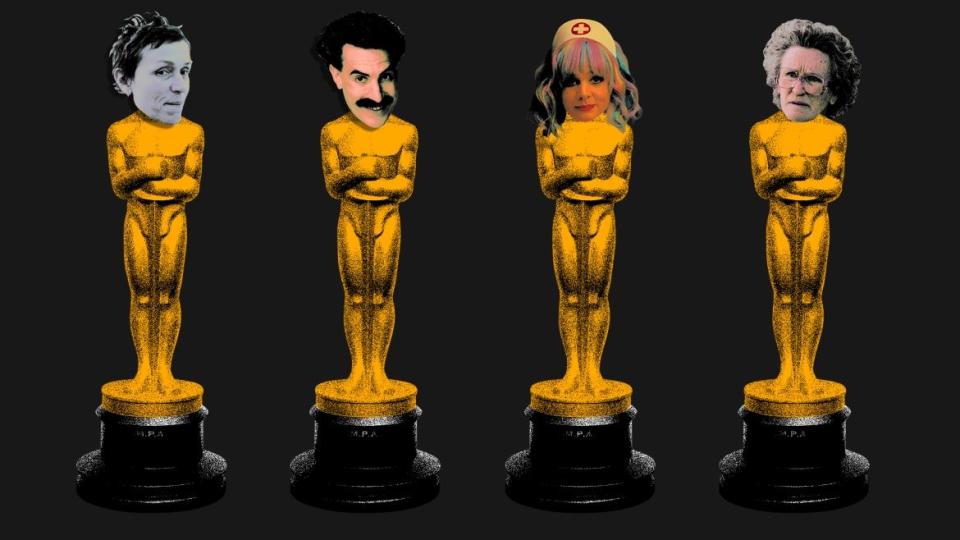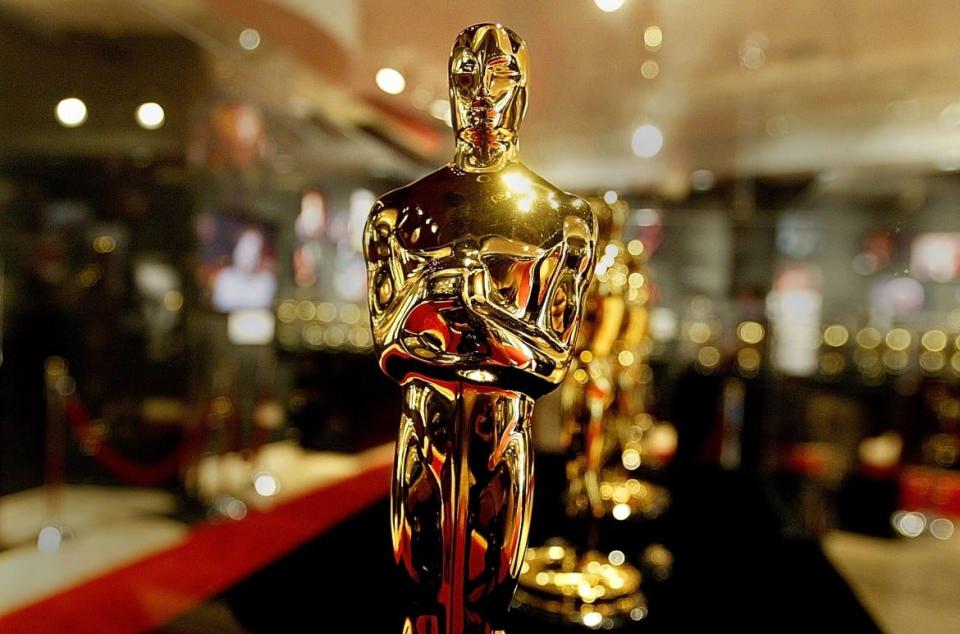Should We Even Have the Oscars During a Deadly Pandemic?

Marlow: Well… we’re back. It feels like a lifetime ago that Bong Joon-ho stumbled up to the Oscars stage, hugged Spike Lee, shouted out Scorsese, and proclaimed, “I will drink until next morning.”
Kevin: Little did he know that there would be a pandemic, the world would shut down, our everyday existence would be blanketed by fear, anxiety, sadness, and rage, and we would, in fact, be drinking until next April.
Marlow: There’s been a lot of red wine consumed in this apartment. And yes, things have been pretty downhill since then to say the least, what with that deadly global pandemic you mentioned, police killings of unarmed Black people, an endless series of mass shootings, the storming of the U.S. Capitol by rabid Trump cultists, and that L.A. fro-yo shop that had the audacity to sell sugar-free cookies (kidding). But the 93rd Academy Awards will air this Sunday, April 25, following a two-month delay due to the ongoing pandemic. Given the massive ratings dips for the Golden Globes and Grammys, and the fact that most 2020 studio films were pushed a year, the ceremony—which will again go host-less—is poised to attract the smallest audience in living memory.
Kevin: It is literally my job, and I keep forgetting the Oscars are Sunday. It’s sad… Baby Kevin used to treat this as the holiest day of the year. It was more like Christmas than Christmas. Now it’s an annoying plan that I keep having to mutter “oh shit” about because I keep forgetting it’s happening.
Donald Trump Loves the Oscars More Than Anybody Ever Has or Ever Will
Marlow: Aw, Baby Kevin! OK, so what’s all the chatter about? Unlike last year, when you had the ghost of Jeffrey Epstein, the silly Joker hullabaloo, and Scarlett Johansson’s full-throated defense of Woody Allen (which certainly hasn’t aged well) looming over the proceedings, this year’s biggest controversy is over… Amazon, apparently?
Kevin: I assume you’re talking about the Nomadland discourse, but before we get into that I want to counter with what I actually think has been the biggest controversy: that the Oscars are happening at all—and the way that they’re happening. And I’m not talking about the “do we really need to have a show in which famous people give each other awards while we’re still struggling to control a deadly pandemic” question. Or the “despite the fact that this year you can actually watch all the nominees from your home, it’s still the annual situation where no one has seen the movies” conundrum.
Marlow: I’d be lying to you if I didn’t admit that it’s been challenging watching so many movies from home this year. Often, I’d opt to re-watch light TV fare, like Gossip Girl or How To with John Wilson (seriously, everyone please watch this if you haven’t).
Kevin: I’m talking about the completely botched messaging about how producers, who this year include Steven Soderbergh, want the ceremony to take place. Like many of us, they’ve had enough of awkward Zoom award shows—though I’ve come to adore chaos—and originally insisted that nominees and winners would only be included in the show if they flew to Los Angeles and attended in person, a demand for non-essential travel that is patently outrageous given the current case numbers and practically impossible for nominees in Europe and many other countries, where there are bans against leaving. They finally caved after the lunacy of the idea was exposed.
Marlow: And it was pure lunacy.
Kevin: But now it’s come out that, following months of messaging that the ceremony will be filmed “like a movie”—whatever the hell that means—the show will be treated like a film production abiding by COVID-19 safety regulations. That means that attendees won’t have to wear masks while it’s shooting. Nothing combats the criticism that Hollywood abuses its privilege and power like skirting safety protocols on a technicality and telegraphing a horrible message about group gatherings in this late stage of the pandemic for purely aesthetic reasons!
Marlow: I’m with you on this. As our own Tarpley Hitt reported, there have been a number of COVID-19 outbreaks on Hollywood sets during the pandemic—including an outrageous incident wherein the She’s All That television remake, starring a number of TikTokers, attempted to shut down a popular COVID testing site to shoot there.
Kevin: Hollywood pretended to work alongside the people and help us all get through the pandemic together as equals, but then took off its glasses and turned out to be vapid, destructive, and self-serving all along!
Marlow: Imagine all the people… And while I’m sure (or rather hope) that all these celebs are vaccinated, since a lot of Hollywood folks jumped the vaccine line and got ahold of COVID vaccine codes ahead of eligible recipients, it’s indeed a strange message to send at a time when there’s still a considerable amount of unwarranted skepticism concerning vaccinations and proper safety protocols, and when we’re so damn close to beating this thing. Perhaps Donald Trump will lean into his culture-warrior BS and hate-tweet the Oscars, as he’s done in years past?
Kevin: I live for the idea of Donald Trump starting an alt account on Twitter to anonymously shit-talk the pandemic Oscars. But the interesting thing about this year is—and brace for the rare revelation that portrays Hollywood in a nice manner—there’s not been much to truly hate about the Oscar season. Do I still reject the idea that Mank is a movie, let alone the one that earned the most nominations this year? With the swiftness of my digestive system when I consume dairy. But at the same time… good for Amanda Seyfried, the epitome of an “I root for her!” star.
Marlow: You go, Amanda Seyfried! But yes, it took me three attempts to finish Mank—because I kept falling asleep. Yet another example of Hollywood manking itself off.
Kevin: That is to say that the season has been blessedly light on bad-faith controversies planted to torpedo awards campaigns.
Marlow: Enjoy that cell, Harvey!
Kevin: As you had mentioned, I think probably the biggest “scandal” surrounds Nomadland, and it’s a quiet one. The film is so elegiac and lovely and timely and Frances McDormand-y that I would consider it double-vaccinated and immune to criticism. But amid the headlines and debate about Amazon’s workers, their attempts to unionize, and the working conditions they’re forced to endure, the segment of Nomadland that depicts McDormand’s character’s time working at a distribution center with a non-judgmental matter-of-factness certainly starts to sour.
Marlow: It certainly paints Amazon as a pleasant place to work, where factory laborers are treated to comfortable lunch breaks which, given the numerous reports of workers pissing in bottles because they’re so overworked, seems like the stuff of fantasy.
Kevin: Wilfred Chan wrote a piece in Vulture titled “What Nomadland Gets Wrong About Gig Labor,” pointing out the problematic nature of the film portraying an older American’s experience working for Amazon without zeroing in on the company’s sins and allegedly abusive treatment of its employees. I wonder, to play Devil’s advocate, if that judgment belonged in a film that’s such a character study—that’s not the story that writer-director Chloé Zhao is telling, so do we have the right to demand it?—but also wonder, in this odd awards season with this small and quiet movie… does anyone, at least anyone voting for the Oscars, care?
Marlow: I don’t think they’ll care too much. I agree with the criticism though, and found the Amazon scenes to be tone-deaf, and the overall portrayal of these migrant laborers pushing through life with quiet contentment to be a considerable stretch. But the film is beautifully directed—nobody pulls off those magic hour shots quite like Chloe Zhao—and McDormand is an absolute force in it.
Where to Stream ‘Minari,’ ‘Nomadland,’ ‘The Father,’ and Other Oscar Nominees
Kevin: In Heaven, life exists purely in Zhao’s Nomadland magic hour shots.
Marlow: It will still likely win Best Director and Best Actress, though Viola Davis could take home the latter for Ma Rainey’s Black Bottom. I do want to pour one out for poor Glenn Close, who was forced to degrade herself in Hillbilly Elegy to win her long-overdue Oscar, only to have her run spoiled by the author of the source material, J.D. Vance, being such an exasperating shithead. Over the past several weeks, Vance has taken it upon himself to praise Tucker Carlson after his white-supremacist “replacement theory” speech and applaud the passage of racist voting laws in Georgia.
Kevin: What I’m very curious about is whether this was legitimately unexpected by Netflix. Vance has kind of always been a surface-level dipshit. This is the classic situation where you give someone a tiny soapbox and turn up the volume oh-so-slightly on their megaphone, and then it starts to register on the Richter scale.

Marlow: I do wonder if Netflix successfully had him muzzled until the Oscar nominations were announced, because his Peter Thiel-backed Senate run announcement—and the white-nationalist comments that came in its wake—only happened after. Though really, everything about this film was a mess, from the movie itself to that time director Ron Howard retweeted far-right pundit Ben Shapiro’s glowing review of it.
Kevin: The other thing that isn’t so much a controversy, but just something I’m very curious about, is how Promising Young Woman will fare. Of all the nominees this year, it’s probably the film that people have the most extreme and passionate opinions about it. I find that thrilling, especially in a sleepy season like this, and consider it a boon to its chances. (Not only does it stand a strong chance at screenplay and actress wins, the New York Times awards pundit Kyle Buchanan has been speculating that the amount of voters ranking it number one on their ballots could even earn it Best Picture.) But the thinkpiece engine has churned out more about this film than any other, with some critics affronted by its depiction of rape culture, revenge, and consent. But again, in a year like this, those grenades start to seem more like little cherry bombs.
Marlow: Odd how it’s provoked such strong reactions since it’s not a very daring film. I told you right after its first screening at Sundance how, despite an excellent Carey Mulligan, I wasn’t the biggest fan of Promising Young Woman. I felt the film pulled its punches and contained plot holes so big you could roll Donald Trump through them—namely, the misguided notion that these predatory men will have learned some deep, life-changing lesson after these tense encounters (attempted rape as… a teachable moment?), the messy ending, and the illogical Bo Burnham twist. Then again, it’s not nearly as bad as The Trial of the Chicago 7—a film that played like a bad SNL sketch.
Kevin: Ah, and so we end with the most controversial opinion of all: Aaron Sorkin’s dialogue is like sweet, didactic, overly earnest music to my ears, and I legitimately loved Trial of Chicago 7. The longest awards season in modern Oscar history finally wraps as it was always meant to: Kevin gets canceled.
Get our top stories in your inbox every day. Sign up now!
Daily Beast Membership: Beast Inside goes deeper on the stories that matter to you. Learn more.

